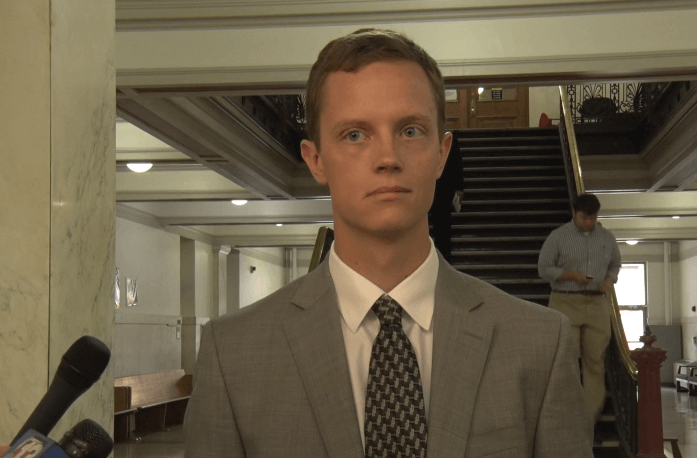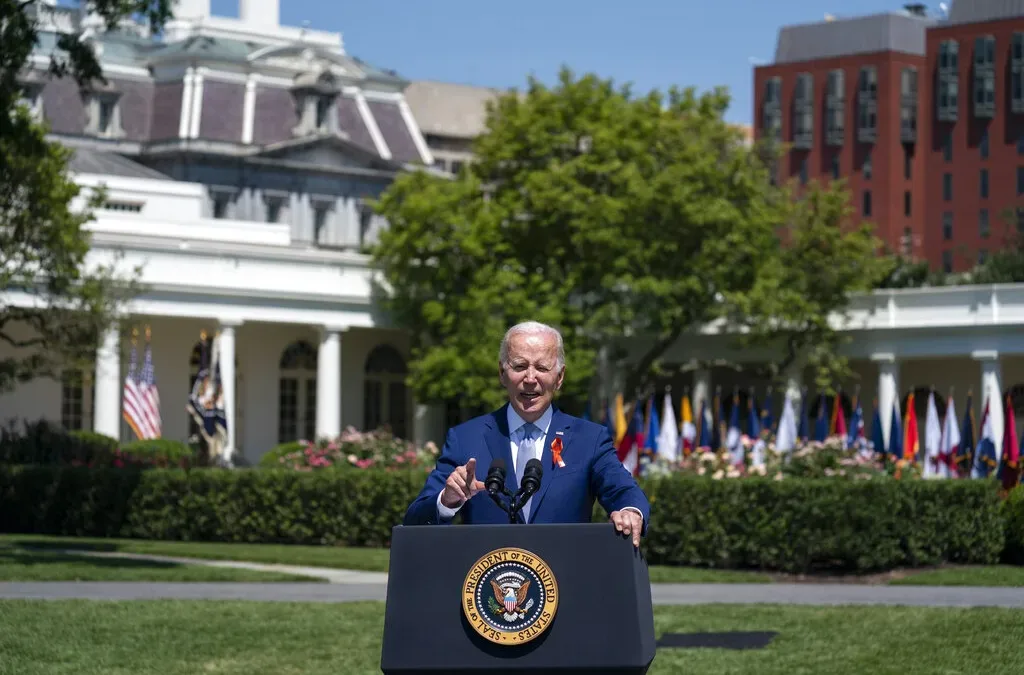
Were Rob Sand to run for office in the near future, he’ll already hold many qualifications of a successful candidate for public office: an Assistant Attorney General, family man, rural upbringing and… chicken wrangler. That last one he added to his resume early on growing up in Northeast Iowa, where he developed an appreciation for small-town life, the outdoors and civic engagement. Now he lives in Des Moines, where his work as a 33-year-old attorney fighting corruption and fraud for the state has built him an impressive profile.
Sand is fresh off a major legal victory from earlier this month, securing a conviction and 10-year sentence in a high-profile case of a lottery official who attempted to manipulate a multi-million dollar lotto drawing. Many in the Des Moines legal community doubted it was a case Sand would win, but the young attorney prevailed in a way that’s quickly becoming a trend for Sand – and one that have many wondering what might be in his future.
Sand sat down with Starting Line earlier this year to chat about his upbringing, his views on the country’s dysfunctional politics and why he doesn’t think people should be shy about their interest in running for office.
Son Of Decorah
Sand was born and raised in Decorah, the scenic town of 8,000 in the hills of Northeast Iowa, with a mother and father who met at Luther College. He says he loved growing up in a small town, where he worked a number of jobs that Iowans from more rural counties know all too well.
“My first job was catching chickens,” Sand explains. “We’d pull the truck up into the barn with the lights turned off, put on a pair of thick gloves and basically walk up behind chickens, grab them by the legs, then grab one and grab another and eventually get to holding four at a time once you get the arm strength. And you’d hand them up to the guys up on the truck and they shove them into these cages.”
“I started doing that when I was 14,” he says, noting the job wasn’t without its hazards. “They try to scratch you, and even if you’re not that good at grabbing them, their last line of defense is to piss and shit all over you. So you go home literally covered in chicken shit. So it was a very good experience in terms of when you later get a job at McDonald’s you’re really excited about it. Even if you go home feeling greasy, which you do, there’s worse things than feeling greasy.”
Sand worked a number of non-chicken-related jobs in the years afterwards, and filled his time at school with soccer, music and theatre. However, the most formative moment of his teenage years was when he got involved in a local effort to build a skate park during his sophomore year of high school.
“It really changed the direction of my life altogether,” Sand says of his push to convince the town to turn an old sand volleyball court, which he notes was essentially being used as “an extremely large kitty litter box,” into a park to accommodate the local skateboarders.
Many youths in town were getting kicked off local properties, though it’s not like they were going away. So Sand collected 350 signatures from neighbors near the proposed park, spoke with the city council about it, met with the parks and recreation board and kept coming up with ideas and locations. After a year and a half’s work, Sand both convinced the local government to approve the project and helped raise money to fund it. They poured the concrete for it the summer after he had graduated and left town.
“I saw something that to me was a problem in town, I brought that problem’s existence to the attention of people who were tasked with helping to solve it, and just kept doing what I needed to do to get it fixed,” Sand recalls. “And it ended up having real results. It opened my eyes. Here’s something I really enjoyed doing, that I feel good about doing because I had a positive impact on my community, and it appears at least that I was OK at it, that I got it done. That affected what I wanted to do afterward.”
Creating Discussion In College
What Sand did afterward was study political science at Brown University in Rhode Island. He figured he’d spend a few years seeing a different part of the country, and was inspired to choose Brown, which he first found out about at the Iowa Young Writers Studio.
“The people there are very intelligent and very happy – which I don’t think those two things go hand in hand very often – and very interested in what’s going on in the world,” Sand says of his first impression of the university, but mentions he still thought there could be more once he got there. “Brown has a reputation for, better or worse, being a very liberal school. When I got there I was sort of disappointed with the lack of diversity in the class offerings.”
Sand took three classes where he was assigned to read the Communist Manifesto and readings from Marx and Weber, but noted he was never assigned to read The Wealth of Nations. Because Brown offered a special program where you could design your own class and syllabus, he decided to expand the discussion himself, organizing a class on conservative thought.
“It gets really boring talking to people you agree with,” Sand says. “Fundamentally I think it’s much more interesting to talk with someone you disagree with. It’s the same ends, different means. We all value this, but we have different beliefs of how to get to it. That was pretty interesting .”
The class attracted a mix of students from various ideological backgrounds, and later became so successful that it turned into a larger movement at Brown. The university now hosts a Janis Forum that invites people on opposite ends of an issue to come debate in front of an audience.
“It makes me a big believer in small things having a big difference,” Sand says of the class’ long-lasting legacy at Brown.
Returning Home For Law School
After three years in Rhode Island, Sand felt the call of the Midwest beckoning him to come back home. He applied to several law schools, and got accepted to Harvard, but opted for the University of Iowa, feeling it made better sense financially and personally.
“I wanted to explore, but it turns out I didn’t need exploring so much as I needed being exposed to something different,” Sand explains.
It was a busy time for Sand at Iowa, where he served as President of the Student Body while also working as the editor-in-chief of the law journal. His legal studies led him to a particular interest in consumer fraud protection, something which Iowa lags behind the rest of the country in. While at Iowa he lived on Olive Court, a block from Kinnick Stadium.
Attorney General’s Office
Right after graduating from law school in 2010, Sand landed a job in Iowa’s Attorney General’s office.
“I really got thrown right into the fire,” Sand says, already having racked up 30 trials in his time there, all of which were either felonies or dealt with sexually violent crimes.
Sand has handled a multitude of case topics, though much of his work deals with elder abuse and fraud, like cases where scammers take advantage of the elderly with bad investments. He also handles some financial cases, official misconduct, embezzlement, and some cases dealing with armed robbery, attempted murder and sexual assault.
“I enjoy what I do,” Sand says. “A lot of the people I prosecute have led decent lives, and done good things with their lives, but then have also made terrible, intentionally wrong decisions that they knew were wrong and they got to pay the price for it. Fundamentally sometimes that’s very frustrating. It’s not fun for me when I go to court and ask a judge to send someone to prison who’s got kids in their house. It’s heartbreaking. Nobody wins in that situation. But you’ve still got to have law, there still has to be consequences.”
Some of what he’s seen with other cases have left a lasting mark on Sand.
“I’ve had some really disturbing cases to work on sometimes, haunting cases,” he explains. “It’s really horrible, ugly things. We can’t just pretend it doesn’t exist. I’ve always been a big believer in God, and maybe didn’t have a strong opinion on the other side of things. But it makes me a strong believer of a sense of darkness in the world, the force of darkness. You sit in small rooms with these guys and they’ve done unspeakable acts to children.”
He notes that you can talk about what drives these people with various mental illness reasons, but the “why” always remains a mystery.
A Future In Elected Office?
Sand’s interest in politics formed early on while watching the major legislative showdowns between Bill Clinton and the Republican Congress in the 1990’s. His curiosity in political viewpoints continued throughout college, and motivated him to take a semester off to work in Senator Tom Harkin’s office in Washington, D.C. He worked for Ed Fallon’s campaign for Governor in 2006, and then ran Denise O’Brien’s general election effort for Secretary of Agriculture.
So does Sand envision himself running for office in the near future?
“I try not to be coy about that,” Sand says of his interest in elected office. “Because I think we’ve got a problem in that when people, kids in particular, tell you what they want to do, you encourage them and say, ‘that’s great,’ go be an astronaut, go be a doctor, go be an engineer. But if anyone tells you they want to be an elected official, you look at them sideways. That’s not the way it should be. It’s silly to be coy about that because we ought to be talking about it like it’s anything else. It’s the office of a citizen, you ought to be talking about it like you want to go vote in four years. Everyone should want to serve in some capacity, or multiple capacities.”
Sand doesn’t have any particular office in mind at the moment, nor is he set on any sort of timeline. But he hopes to run at some point in order to provide leadership in what he feels is missing in politics and the public debate.
“One of the biggest things I think is missing is conversation and relationships between the two parties,” he explains. “I think a lot of people have forgotten about the possibility that we can all be wrong about things. It just might be the person you’re arguing with is right. There’s a level of incivility and distrust and demonization that goes back and forth, and it isn’t healthy for our country … Republicans are not evil people. They’re Americans who disagree with Democrats on a lot of different issues, sometimes passionately.”
“Sometimes I feel like the United States is the first team summiting Mt Everest,” Sand continues. “And everyone else is a few or many steps behind, looking up at us. Instead of summiting hand-in-hand, triumphantly, we’re pushing and pulling and trying to trip each other to be the first to get to the top. It’s childish.”
In The Meantime
While those ambitions may be down the line, Sand stays plenty busy right now with his work and family. He lives with his wife, who he met at a backyard BBQ in Des Moines, and their one-year-old son. He’s stayed true to his rural roots as well, spending a lot of his free time fishing, hunting or just enjoying the outdoors. Sand is especially fond of bow hunting, which he took up at the age of 14 with his father.
“I’d almost always rather be outside if I can be,” he says.
You can follow Rob Sand on Twitter at @RobSandIA
by Pat Rynard
Posted 9/29/15
Politics

Biden announces new action to address gun sale loopholes
The Biden administration on Thursday announced new action to crack down on the sale of firearms without background checks and prevent the illegal...

Biden cancels student loan debt for 2,690 more Iowans
The Biden administration on Friday announced its cancellation of an additional $7.4 billion in student debt for 277,000 borrowers, including 2,690...
Local News

No more Kum & Go? New owner Maverik of Utah retiring famous brand
Will Kum & Go have come and gone by next year? One new report claims that's the plan by the store's new owners. The Iowa-based convenience store...

Here’s a recap of the biggest headlines Iowa celebs made In 2023
For these famous Iowans, 2023 was a year of controversy, career highlights, and full-circle moments. Here’s how 2023 went for the following Iowans:...





